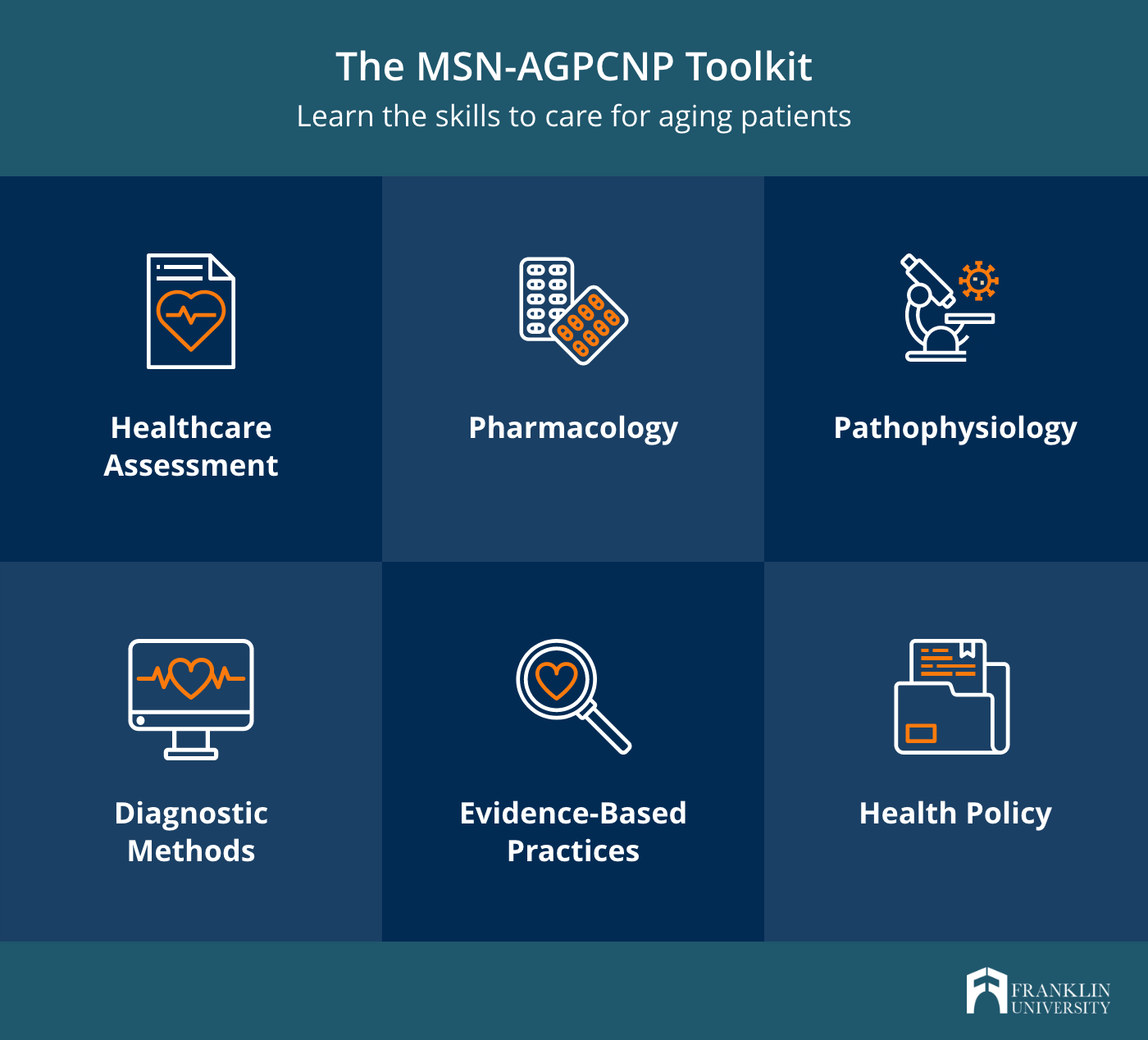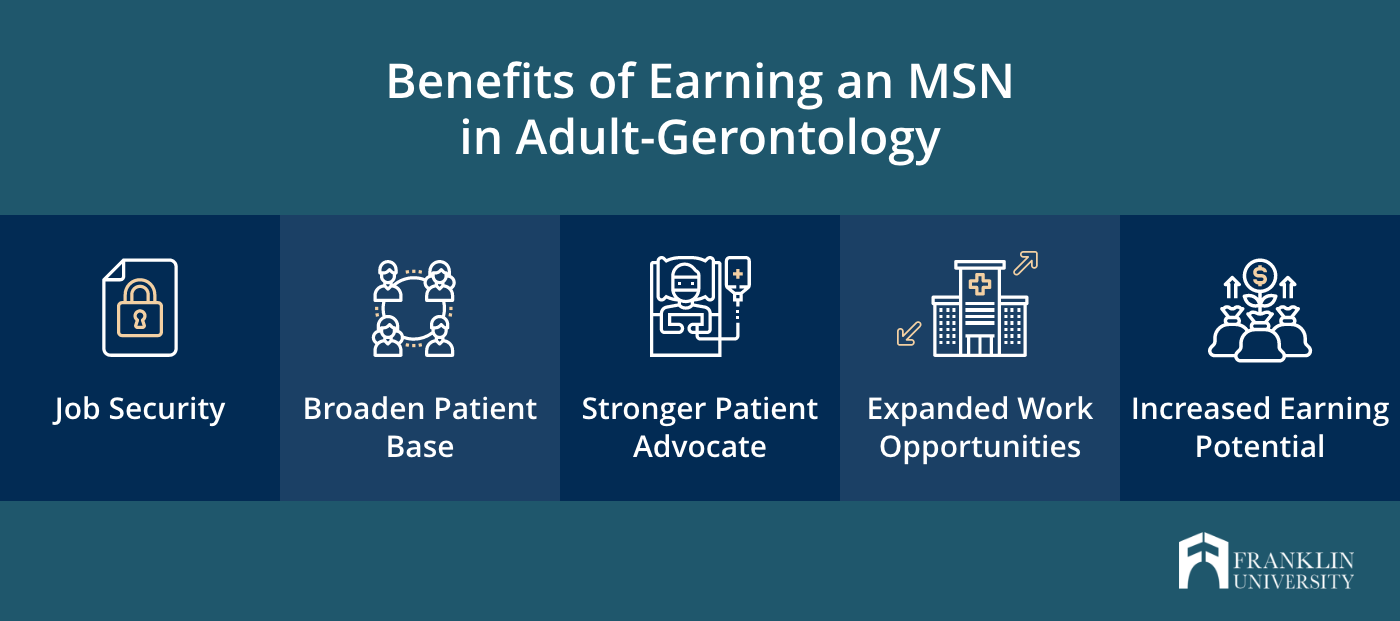Request Information
We're Sorry
There was an unexpected error with the form (your web browser was unable to retrieve some required data from our servers). This kind of error may occur if you have temporarily lost your internet connection. If you're able to verify that your internet connection is stable and the error persists, the Franklin University Help Desk is available to assist you at helpdesk@franklin.edu, 614.947.6682 (local), or 1.866.435.7006 (toll free).
Just a moment while we process your submission.

Is an MSN in Adult-Gerontology Worth It: Big Questions Answered
For as long as you can remember, you’ve been driven by one thing - a desire to provide care and comfort to adult patients. Two of the most popular ways to do this are as an FNP (family nurse practitioner) and an AGPCNP (adult-gerontology primary care nurse practitioner).
In this article we’ll explore what makes each unique and provide information to help you decide which might be the best career path for you.
Is There A Big Difference Between AGPCNPs and FNPs?
An FNP and an AGPCNP have some of the same basic skill sets. What sets them apart is how they use those skills within their patient population.
Adult-Gerontology Primary Care Nurse Practitioners
An AGPCNP uses their skills and knowledge to treat patients from adolescence through end-of-life. With a particular focus on an older patient population, the AGPCNP will:
- Evaluate senior health plans
- Develop home-health treatment plans
- Assist in the transition between patient care centers
- Conduct assessment exams
- Order and interpret tests for diagnosing current issues and screen for areas of potential concern
Family Nurse Practitioners
A family nurse practitioner uses their skills and knowledge to treat patients of all ages. The FNP can:
- Treat illnesses
- Prescribe some medications
- Order diagnostic tests
- Assist in performing tests
- Provide exams
- Maintain records
- Provide health management education
Considering the opportunities for care that nurses in both roles have, earning an MSN in Adult Gerontology is a favorable choice for individuals who want to spend their careers specializing in the care of an older patient population, not just caring for patients across the spectrum of their lives.
What is the Salary and Career Potential for AGPCNPs?
The American Association of Medical Colleges (AAMC) has predicted that by 2032 there will be a shortage of over 120,000 medical professionals. In turn, over 45% of the population of the U.S. will be over 65 years old.
This presents a very real need for nurse practitioners including FNPs and AGPCNPs. What can nurses entering those careers expect from a practical standpoint? And what might they need to to get started?

Get a FREE guide to help you advance your career, featuring helpful advice and thoughtful insights from nursing experts.
What Will You Learn While Earning an MSN-AGPCNP

A Master of Science in Nursing (MSN) is a layered degree program that offers a path for nursing professionals who want to work in adult-gerontology. In an MSN-AGPCNP program a student will learn, among other things, these five key skills:
How to perform an advanced healthcare assessment
While there are baseline health assessments that a provider can perform on any
patient, geriatric patients present with specific needs based on their age and extensive health history.
It takes a specific skillset to know what questions to ask, what areas to focus on and what baseline results to compare patient results against.
How to treat age-related sickness
Every patient population has specific health needs related to it. In an MSN program you’ll move from understanding “general” care practices to specific treatment and care needs.
How to create care plans
A skilled, knowledgeable AGPCNP can help create home healthcare plans that address all of the unique situational aspects of a patient. It’s more than just printing off some handouts, it’s creating a custom plan that is not just something a patient should do, it’s something they can do based on their health limitations.
How to create care plans
A skilled, knowledgeable AGPCNP can help create home healthcare plans that address all of the unique situational aspects of a patient. It’s more than just printing off some handouts, it’s creating a custom plan that is not just something a patient should do, it’s something they can do based on their health limitations.
5 Reasons to Earn MSN in Adult-Gerontology

When considering whether to pursue an MSN in adult-gerontology you’ll find both practical and altruistic reasons. Five of the biggest reasons are:
1. An aging population means job security
An aging U.S. population means that more AGPCNPs will be needed to care for patients and to take the place of retiring nurses. Because of these factors, The U.S. Bureau of Labor Statistics predicts that in the next 10 years, the need for nurse practitioners will grow faster than any other profession.
2. It will broaden your patient base
An AGPCNP can provide a broad range of care to both adult and adolescent patients which can create a challenging and exciting patient base. It also provides an opportunity for AGPCNPs to leverage their experience treating older patients to inform potential treatment options for younger ones.
3.You’ll be a stronger patient advocate
An MSN provides you with a certain authority and deeper knowledge that will enable you to more confidently act as an advocate for your patients, particularly those who might be alone or have problems fighting for their own care.
4. It opens opportunities for where you can work
Holding an MSN opens the possibilities for where you can practice. AGPCNPs generally find themselves in practice locations like nursing homes, inpatient facilities and private practices.
Those working in other adult-gerontology specialties — AGACNP (adult-gerontology acute care nurse practitioner) — are often at home in intensive care settings, urgent care locations or on the hospital floor.
5. You’re increasing your earning potential
The average median base salary of an AGPCNP $102,038. Based on your location, your practice location, and your experience this number can grow by $15,000 to start.
Ready to Explore Your MSN Options?
The role of AGPCNPs will become even more important in the next 10 years. It’s critical that those moving into that career have access to the knowledge and experience they need to make an immediate impact on our healthcare workforce.
Some universities, like Franklin, are helping to prepare the future AGPCNPs by structuring degree programs with the understanding that students have jobs, lives and financial commitments outside of the classroom.
Are you ready to explore this MSN-AGPCNP opportunity?





